Ann Arbor Civic Theatre finds the character-driven "Proof" a good fit on its Second Stage
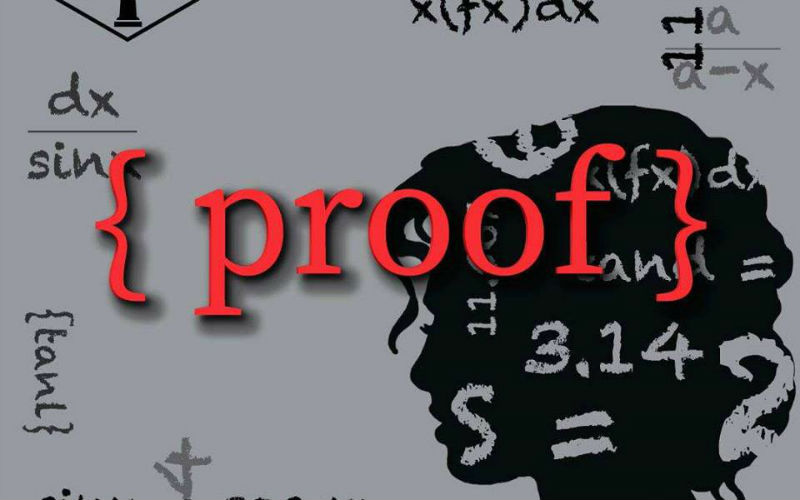
Theater is sometimes about spectacle: chandeliers that crash before our eyes, ocean liners that seem to sail across a stage, or bloody battles at a Paris barricade.
Alex Duncan was interested in a different kind of theater when she suggested directing David Auburn’s Proof for the Ann Arbor Civic Theatre’s Second Stage. The play’s intimate drama of a troubled young woman and her relationships seemed right for the Civic’s small studio theater and Duncan’s minimalist approach.
“It’s beautiful,” she said. “The language is almost poetic. I’ve always liked dialogue and character-driven things as opposed to, I guess, a little more flash going on. It’s fun digging into the language and working with the characters and figuring out what the actors are going to bring to it and blend that with what I see in the show.”
Duncan, who graduated from Eastern Michigan University with a drama major, directed a Main Stage Civic Theatre production of Arsenic and Old Lace last year and when applications went out for production ideas this year, she proposed Proof. It wasn’t selected for the Main Stage, but in the second round of interviews it was picked for Second Stage.
Invisible Touch: "As Far As My Fingertips Take Me" explores the universal refugee crisis through a one-on-one encounter

Whenever I see news footage of refugees, I always think, “How bad would things have to get before I packed a bag and fled from my home?”
The answer, of course, is really, really bad, especially when doing so would likely put me in mortal danger and leave me vulnerable, indefinitely, in countless ways.
So I knew that As Far As My Fingertips Take Me -- a one-on-one installation performance that’s part of University Musical Society’s No Safety Net 2.0 theater series -- would likely challenge me and make the pain of diaspora more tangible. But what I couldn’t have guessed is how strangely attached I’d become to the visible marks it left upon my skin.
Created by Tania Khoury and performed by Basel Zaraa (a Palestinian refugee born in Syria), the experience begins when you bare your left arm to the elbow, sit next to a white wall, pull on a pair of headphones, trustingly extend your arm through a hole in the wall, and listen to a recording of Zaraa telling his own refugee story, accompanied by an atmospheric rap inspired by his sisters’ journey from Damascus to Sweden.
Theatre Nova actors shine in an otherwise thin "Apple Season"
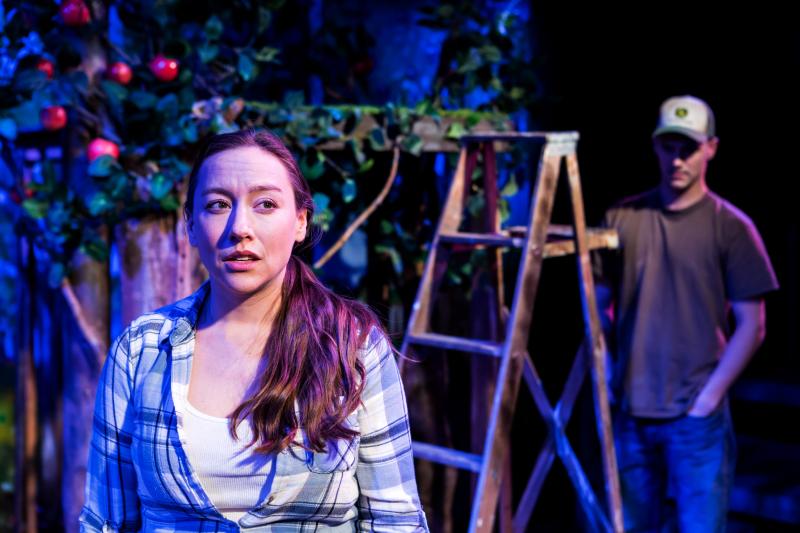
E.M. Lewis’ Apple Season is a memory play. Memories haunt and suffocate three people who have had trouble moving on.
Three excellent actors bring quiet authority to their performances in Theatre Nova’s Michigan premiere of Lewis’ play under the direction of David Wolber. While Lewis’ play strains to be poetic, seems thin, and is too much like other family trouble dramas, but Wolber and his cast bring an honest realism to the story.
Apple Season is a story about dark family secrets, long-repressed emotions, and lost opportunities. Lissie has come back to her Oregon family home to bury her father and decide what to do with the family apple orchard. She is 36 years old, a fourth-grade teacher, and hasn’t been home since running away with her brother to an aunt’s house as a teenager.
60 Minutes: "Is This a Room: Reality Winner Verbatim Transcription" is a terse presentation on how one hour can upend a life
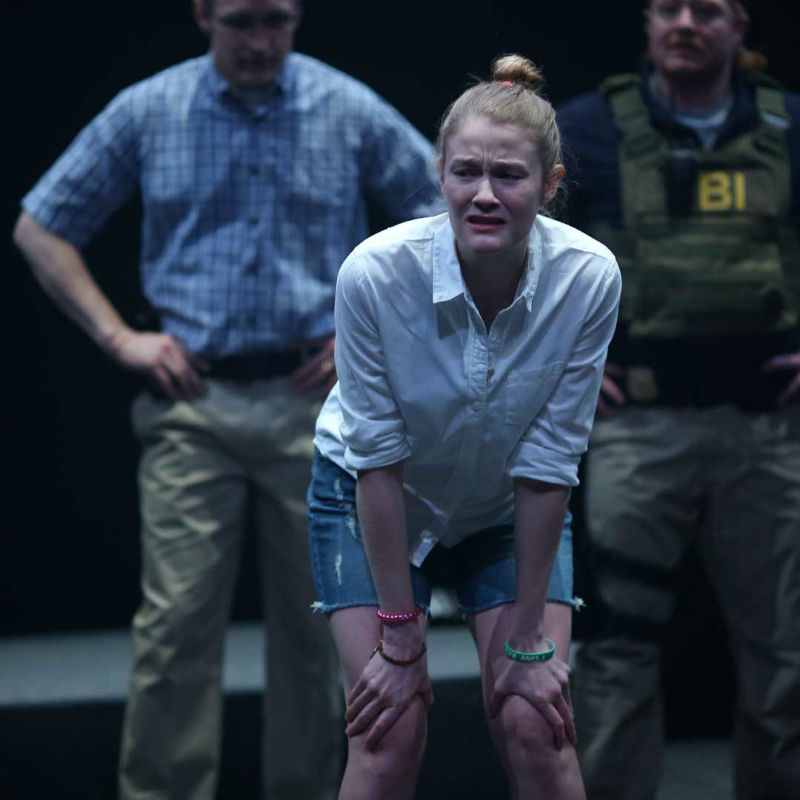
Is This a Room: Reality Winner Verbatim Transcription looks behind the headlines and the newspaper articles of the real case of Reality Winner, a young woman currently serving a lengthy prison sentence for the unauthorized release of classified documents. She had violated the Espionage Act, which dates back to 1917.
Presented as part of UMS's No Safety Net 2.0 theater festival, this roughly one-hour long show highlights a single moment in Winner’s life, her interview with the FBI that ultimately resulted in her arrest. The stage is almost empty of props, and the audience is focused entirely on the four performers, their dialogue, delivery, and use of personal space. At times, the all-male agents crowd Winner, the only woman present at the time of her interview, giving an appropriate feeling of claustrophobia. At one point, the actors’ speech seems to be slowed down or sped up, perhaps giving insight into Winner’s emotional state at that moment.
The dialogue itself comes from, as the title of the piece says, a verbatim transcription of the recording of the interview. It includes coughs, stumbling over words, people talking over each other, and random unrelated phrases (such as “is this a room”) while the agents both converse with Winner and search her home.
Take Comfort: Jeff Daniels and Purple Rose Theatre's "Roadsigns" is like a '70s folk song come to life
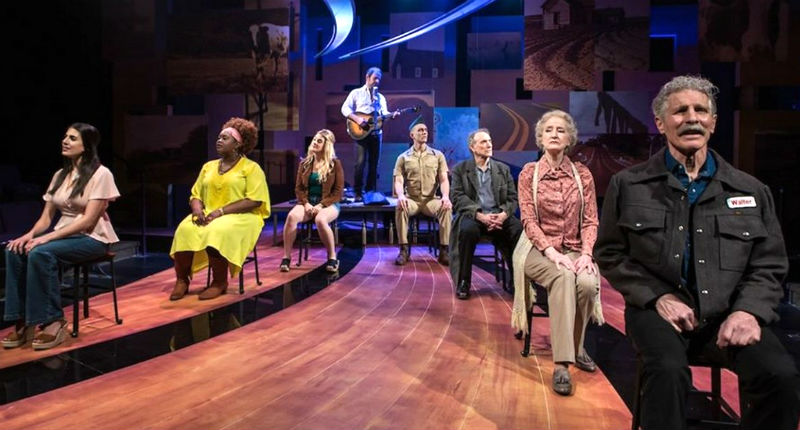
For more than a quarter-century, Chelsea’s Purple Rose Theatre has specialized in new plays that don’t normally require a music director.
That's why I was initially surprised to hear that a musical (or “play with music”?) called Roadsigns would have its world premiere there.
But then I quickly remembered the theater’s movie/Broadway/TV star founder, Jeff Daniels, has been performing his ever-growing catalog of original folk songs as an annual fundraiser for the Rose, and his son, Ben Daniels, is a professional musician in his own right.
Then the whole notion of a Purple Rose musical felt not just sensible but downright inevitable.
"The Believers Are But Brothers" explores the darkest corners of the internet

Last night it felt like Javaad Alipoor's The Believers Are But Brothers started in the lobby of U-M's Arthur Miller Theatre. I was asked by a stranger for my phone number so I could be added to a WhatsApp group chat with a couple of hundred other people I didn't know for a discussion that ran concurrently with the play, including messages from Alipoor.
I complied but instantly questioned my decision: I had voluntarily given up personal info with no questions asked, just as all of us do every day on the internet, and I did so on the same day it was reported that Amazon's Jeff Bezos had his phone hacked by malware sent via WhatsApp by Saudi prince Mohammed bin Salman.
The Believers Are But Brothers, co-directed by Alipoor and Kirsty Housley, explores how technology and the internet can make people compliant, reactionary, or radicalized. But Alipoor didn't write Believers to slam our reliance on screens and the World Wide Web. Standing on a minimalist stage decorated by a plastic folding table hosting a computer-gaming setup, a large video screen, and the lurking presence of a headphone-wearing man (Luke Emrey) whose eyes were fixed on his laptop, Alipoor talked about how the internet has always been a part of his life and that he loves social media, even with all the caveats.
“I try not to make work that is either negative or positive, but just to look at what we do,” Alipoor told The Guardian on the eve of the BBC showing a filmed version of The Believers Are But Brothers, which explores the 4chan world that birthed the Gamergate ugliness, the radicalization of young men -- whether brown kids from the U.K. or white boys from California -- and the rise of the alt-right.
Performance, Art: UMS's "No Safety Net 2.0" offers theatrical productions that challenge norms

UMS's No Safety Net 2.0 series offers theatrical performances, of course. But it's the sort of theater that even avid theater-goers might not be able to get a handle on.
After all, it's a long way from sitting in the audience and passively watching the singing and dancing in West Side Story to interacting one-on-one with a refugee as your arm is stuck in a wall during the experimental play As Far As My Fingertips Take Me.
The 2020 edition of No Safety Net explores terrorism, addiction, racism, BDSM, transgender identity, patriotism, migration, and a whole host of hot-button issues through four unique theatrical works: The Believers Are but Brothers (Jan. 22-26), As Far As My Fingertips Take Me (Jan. 24-Feb. 9) Is This a Room: Reality Winner Verbatim Transcription (January 29-February 2), and White Feminist (February 3-9).
But since a huge part of UMS's mission is education -- whether it's for young members of the community, potential patrons, or those already open to new works -- it always provides tremendous resources for people to take deep dives into the cutting-edge productions the organization throws its considerable weight behind.
This year's No Safety Net's ancillary assets include podcasts, videos, chats, essays, and blogs chock full of information to give you insights and contexts into these challenging works. Below is a selection of No Safety Net media, including the January 16 Penny Stamps lecture at the Michigan Theater by Oskar Eustis, artistic director of The Public Theater in New York City, which was the official kickoff of No Safety Net 2.0.
AADL 2019 STAFF PICKS: BOOKS, MUSIC, MOVIES & MORE

AADL 2019 STAFF PICKS: BOOKS, MUSIC, MOVIES & MORE
Below you will see that 41 Ann Arbor District Library employees composed 18,000 words listing arts and culture that made an impact on their lives in this calendar year. While movies, books, and music released in 2019 figured prominently among our picks, we never limit our selections to material from the past year. Not all timeless art can be discovered and absorbed in a mere 365 days, so we're like Master P: no limits.
We're All Crumpet Now: Kickshaw Theatre's production of David Sedaris' "The Santaland Diaries"

Despite the clichéd, eye-roll-inducing notion of creative work that makes you laugh and makes you cry, David Sedaris’ essays are nearly universally adored because they regularly, miraculously achieve just that.
This has become particularly true in recent years as Sedaris has explored, with bracing candor, the painful aftermath of a sister’s suicide and grappled with his complicated relationship with his aging, politically conservative father.
Yes, Sedaris and his craft have both come a long way since his hilarious, breakout 1992 radio essay “The Santaland Diaries” -- chronicling Sedaris’ work experience as a Macy’s elf in New York City during the holidays -- premiered on NPR’s Morning Edition. It’s since become a kind of subversive holiday classic, up to and including a one-man stage adaptation by Joe Mantello that’s now being produced (in Ypsilanti) by Kickshaw Theatre.
Judy, Judy, Judy: Taylor Mac’s "Holiday Sauce" is a mischievous feast for the eyes, ears, and soul
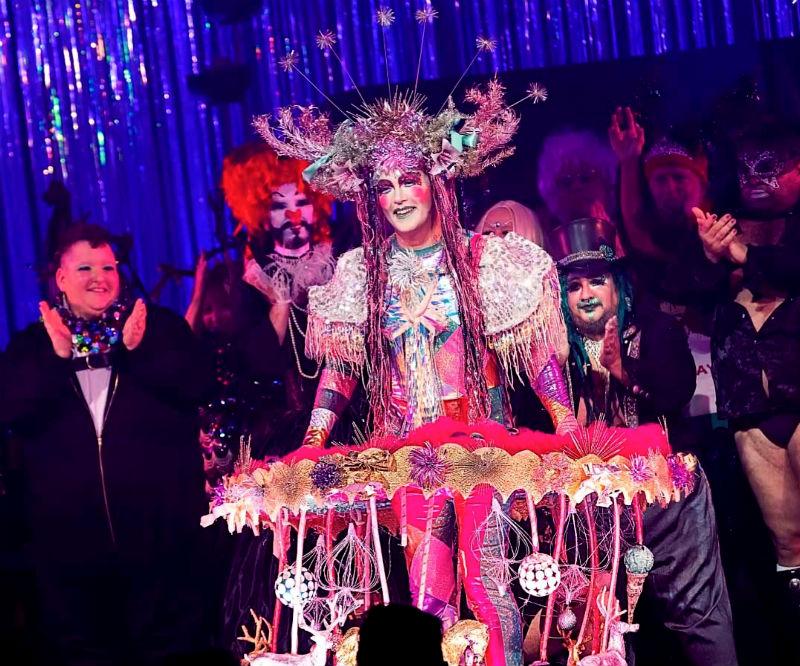
Usually when I see a show for review, I don’t end up on stage, singing a Pogues song.
But then, most shows are nothing like Taylor’s Mac’s Holiday Sauce, which UMS brought to the Power Center on December 14 and 15.
Mac has so many talents that I’d wear out my hyphen key if I tried to list them all. A MacArthur “Genius” and finalist for the Pulitzer Prize, Mac created Holiday Sauce as a tribute to the playwright-singer-artist's drag mother, Flawless Sabrina. “She used to always say, ‘You’re the boss, apple sauce,” Mac said, referring to the show's title, and Sabrina regularly hosted "judy" and others during the holidays. (As Mac told the Los Angeles Times, "[M]y gender pronoun is 'judy’ because I wanted a gender pronoun that is an art piece.”)
And indeed, Mac’s final elaborate ensemble for the evening, which made judy resemble a majestic, snow-covered peak, featured what looked like a formation of tiny pine trees that spelled “BOSS” down the gown’s back.
Mac wore this while performing the show’s quietest and most personal number, “Christmas at Grandma’s,” wherein judy sat alone on stage and played ukulele. The darkly comic, ironically jaunty song chronicled what the holidays were like when judy was annually dragged to visit homophobic relatives who were themselves struggling with past sexual abuse, a serious head injury, and alcoholism.
So … a Norman Rockwell painting come to life, right?
But that’s the point, of course: While we’re all confronted each year by cultural depictions of perfect families joyously celebrating the holidays together, the reality is that a good number of us identify far more with the inhabitants of the Island of Misfit Toys.


































